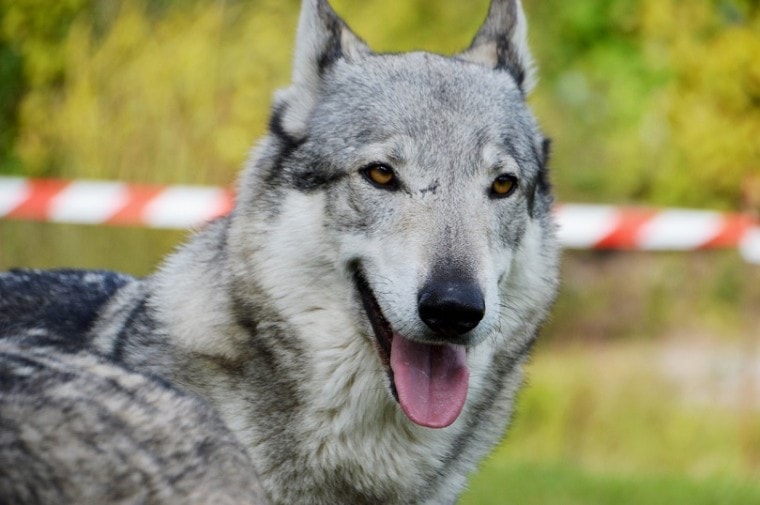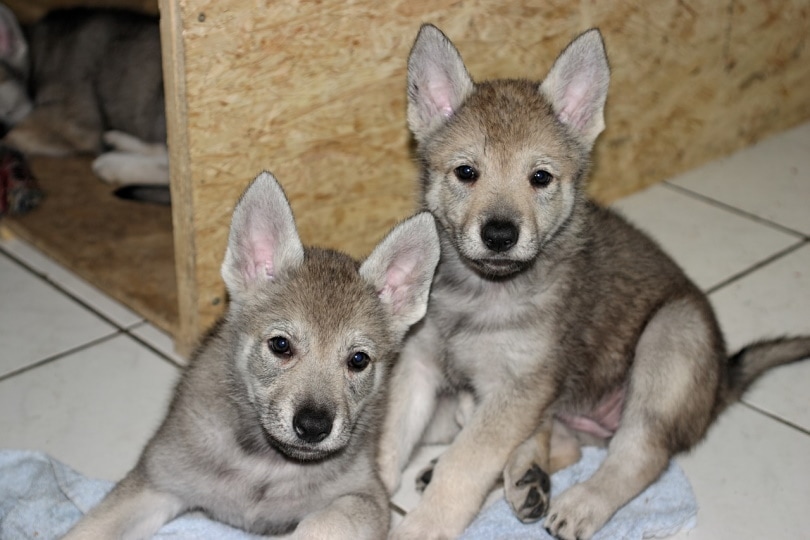
Click Below to Skip Ahead
The Czechoslovakian Wolfdog, or the Czechoslovakian Vlack, is a compact wolf hybrid with a pleasing disposition. These dogs work best for people who have canine experience—they definitely aren’t the right choice for first-time owners.
Breed Overview
Height:
24 – 26 inches
Weight:
45 – 55 pounds
Lifespan:
13 – 16 years
Colors:
Gray, yellowish-gray, silver
Suitable for:
Experienced owners, single-pet households, homes with land
Temperament:
Brave, athletic, social, energetic
However, if you want a highly trainable dog that may challenge you in ways of skill, this breed may be just what you’re looking for. These dogs make excellent candidates for K9 training, service work, and companionship. Let’s learn more!
Czechoslovakian Wolfdog Characteristics
Czechoslovakian Wolfdog Puppies

This Wolfdog breed can be tricky to find, depending on where you live. Wolfdogs require permits in some areas—and many places don’t allow those breeds at all. So, first, you need to check your local laws. Then, you might even have to travel—or move to another state for legal ownership.
These puppies are highly skilled in agility, drafting, tracking, obedience training, and other work tasks. So, if you do buy one—bear in mind that they are meant for work purposes, and Wolfdog prices reflect this. In addition, all puppies should have legal clearance to be placed in homes.
Since these dogs closely resemble other breeds, you have to be wary of backyard breeding practices. Many breeders can claim the breed authenticity, but without proper paperwork, proof of parental lineage, and a good breeding reputation, you can get a bad deal (for both you and the dog). Wolf hybrids without proper breeding are at risk for poor temperament, genetic defects, and destructive tendencies. Therefore, it’s crucial to get a pup from parents who have proven litters.
Temperament & Intelligence of the Czechoslovakian Wolfdog
Czechoslovakian Wolfdogs are brilliant dogs with an unparalleled work ethic. Because of their inclination to serve and bond with people, they make excellent training candidates. These dogs perform duties relating to service, search and rescue, and other intensive tasks.
These dogs are incredibly pack-minded, so they can’t handle being alone for long periods. If you must kennel them while you’re at work, they may exhibit destructive tendencies that can be hard to break. These dogs work best as by-your-side companions.
Social and happy, these dogs are incredibly affectionate and willing to please. They may bond with one person over all others, offering 100% loyalty for their lifetime. Once they see you as the alpha, they will be obedient and look to you for guidance and direction.
They have a goofy sense of humor, always keeping you on your toes. These dogs will stick like glue, making sure they accompany you anywhere you go—even the bathroom. However, the same sentiment might not extend to outsiders.
Wolfdogs love to run and play. But consider that these dogs have incredibly high prey drive, which can be manageable if it’s handled correctly. Still, these dogs should never be unsupervised around smaller animals, as they have natural reactions—like their wild parents.
Wolfdogs also have a potential for mouthy play, excessive digging, and growling vocalizations.
Are These Dogs Good for Families? 👪
These dogs are not ideal for growing families. They are genetically produced for work, and that’s what they prefer to do. These dogs cannot be alone for long periods or become destructive or develop extreme separation anxiety.
While they are incredibly loyal, fun-loving, and intelligent, they work best with a single owner without small children. Plus, since they are so slow to mature, they can easily knock down or hut small kids, mistaking it for play. Therefore, we recommend older kids who have owned dogs before.
Due to their energy and size, these dogs might not work for older adults, either. You have to be prepared to keep up with overall exercise needs, which are intense—even for experienced owners.
Does This Breed Get Along with Other Pets?
You should know before you own a Wolfdog—this dog might never interact well with other pets. They can fight with dogs of the same sex, getting territorial and aggressive. However, they sometimes form strong bonds in male-female pairings.
However, if you properly socialize your Wolfdog from puppyhood, they usually make lifelong buddies with existing canines. If any dominance issue starts around the age of sexual maturity, it’s best to handle the situation for the safety of your pups—professional training is a terrific option.
Smaller animals, including cats, are hazardous to have around these dogs. They have intense prey drives and will likely attack if they have the opportunity. Therefore, these dogs may work best in a single-pet household.
Things to Know When Owning a Czechoslovakian Wolfdog:
Food & Diet Requirements 🦴
Because of their close relation to wolves, these dogs do best on a veterinarian-approved raw diet. Unfortunately, unlike domesticated canines, commercial dog foods do not meet the nutritional profiles necessary to keep their bodies healthy (even recipes with very high protein content).
If you feed these dogs dry kibble or wet food, they can suffer from malnutrition. Instead, they need a diet of whole protein, which can get quite expensive. So, before you opt to buy, you have to consider the cost to feed them.
All meat should be hormone-free, lean, and fresh. You can offer frozen meat, but make sure that it is completely thawed before serving it. Your Wolfdog’s teeth are designed to shred and tear, but you should still consider cubing the pieces for easy consumption.
You might be able to offer these dogs commercial treats. However, they can show adverse reactions, such as allergies, to the ingredients. Therefore, it’s always best to see advice from an experienced veterinarian on your entire diet plan.
Exercise 🐕
Your Wolfdog will want to be on the move all the time. Naturally nomadic, these dogs love to explore the world around them and have a very keen sense of the great outdoors. Because of their high inclination to wander, you should keep them in a harness or in a secure area to ensure no escapes.
On average, these dogs require at least 60 minutes of exercise per day. However, some of them might require much more. It often depends on the individual canine’s energy levels.
Ideally, your Wolfdog should have a safely enclosed, fenced-in area to run. They absolutely love participating in games that get their blood pumping. You will have no issue convincing them to take a jog or play a game of fetch in the yard.
To add, this breed benefits from mental stimulation just as much as physical. So make sure that you’re working hard to keep your dog’s mind occupied in positive ways by offering lots of interactive toys.
Training 🎾
These animals require constant mental stimulation. A bored Wolfdog can quickly lead to trouble. If you keep them in a kennel or separate room in your home, they can bite, scratch, and chew up belongings in no time. Since they are so strong, they can easily escape some enclosures other dogs might not.
Because they are such a high-intensity breed, they benefit very much from professional training. These dogs must learn how to interact with other animals and humans. Learning manners very early will lead to a well-rounded animal that behaves on command.
When it comes to prey drive, your Wolfdog might never lose this behavior. It is an instinct that is incredibly difficult—if not impossible—to train.
Grooming ✂️
Your Czechoslovakian Wolfdog will require frequent grooming. These dogs have a dense double coat, and they shed year-round. If you were looking for a low-shedding breed, this is definitely not the right dog for you.
Your Wolfdog will need daily brushing sessions to keep ahead of bulk patches of fur scattered across your couch. It would help if you also kept de-shedding tools on hand for once-a-week sessions. These tools help lift dead hair from the undercoat to reduce shedding issues.
Because these dogs can have sensitive skin, it’s best to keep all shampoos as natural as possible. Try to avoid products with artificial dyes or scents.
Your Wolfdog should have a bath once every 4-6 weeks. You should follow up bath time with nail clipping, ear cleaning, and teeth brushing.
Health and Conditions 🏥
Czechoslovakian Wolfdogs are very hardy animals with tough immunities. Unfortunately, however, even they can fall ill with the right influences.
It’s vital to secure a vet that will treat wolf hybrids. Some veterinarian offices might reject treatment due to the breed. So finding a vet in your area should be on your checklist before you bring your puppy home.
During the first year of life, your pup will need to see the vet quite a bit. First, they need all necessary vaccinations, growth charting, and spaying or neutering. Afterward, they should see the doc annually for general exams and booster shots.
Minor Conditions:
Serious Conditions:
Male vs. Female
Each Czechoslovakian Wolfdog comes with its own extraordinary personality, so it’s hard to pinpoint differences between genders this way. However, males are a bit slower to mature than females—while females tend to be more energetic all their lives.
Males might also be goofier all around, while females tend to be slightly aloof with strangers. But if the male has a powerful personality, they can be just as big of a challenge to socialize correctly.
Surprisingly, females tend to be the more dominant of the pair. That’s not to say males can’t be, especially at sexual maturity. But females are more likely to assert themselves or even challenge other females if they feel it’s necessary.
3 Little-Known Facts About the Czechoslovakian Wolfdog
1. Several states in the USA ban wolf hybrids.
Since these dogs are technically partially wild animals, many states outlaw them altogether. Other states require permits to own wildlife. There are many risk factors associated with hybrid owning—and you may have to do your research to make sure you aren’t breaking any rules.
Click here for a comprehensive list of hybrid laws by state.
2. Czechoslovakian Wolfdogs have two significant shed periods in a year.
Because of their dense double coats, these dogs go through bi-annual shedding periods where they lose fur in bulk. Wolf hybrids do very well in extreme temperatures, so they are suitable for homes in colder regions.
3. Czechoslovakian Wolfdogs are slow to mature.
While normal canines mature around 1 year of age, these dogs mature much slower. On average, the age of maturity for a Wolfdog is 2-3 years.
Final Thoughts
If the Czechoslovakian Wolfdog sounds like a perfect fit for your lifestyle, it’s time to start researching local laws in your area. Unfortunately, it might prove difficult to find a litter of pups nearby, so prepare for travel.
Overall, if you’re looking for a worker bee that you have lots of time to train and exercise, this dog is an exceptional choice. But owning a Czechoslovakian Wolfdog is no walk in the park. It takes lots of patience, time, and proper resources to make sure you both are happily living.
Related Reads and Breeds:
Featured Image Credit: VIVIANE6276, Pixabay








